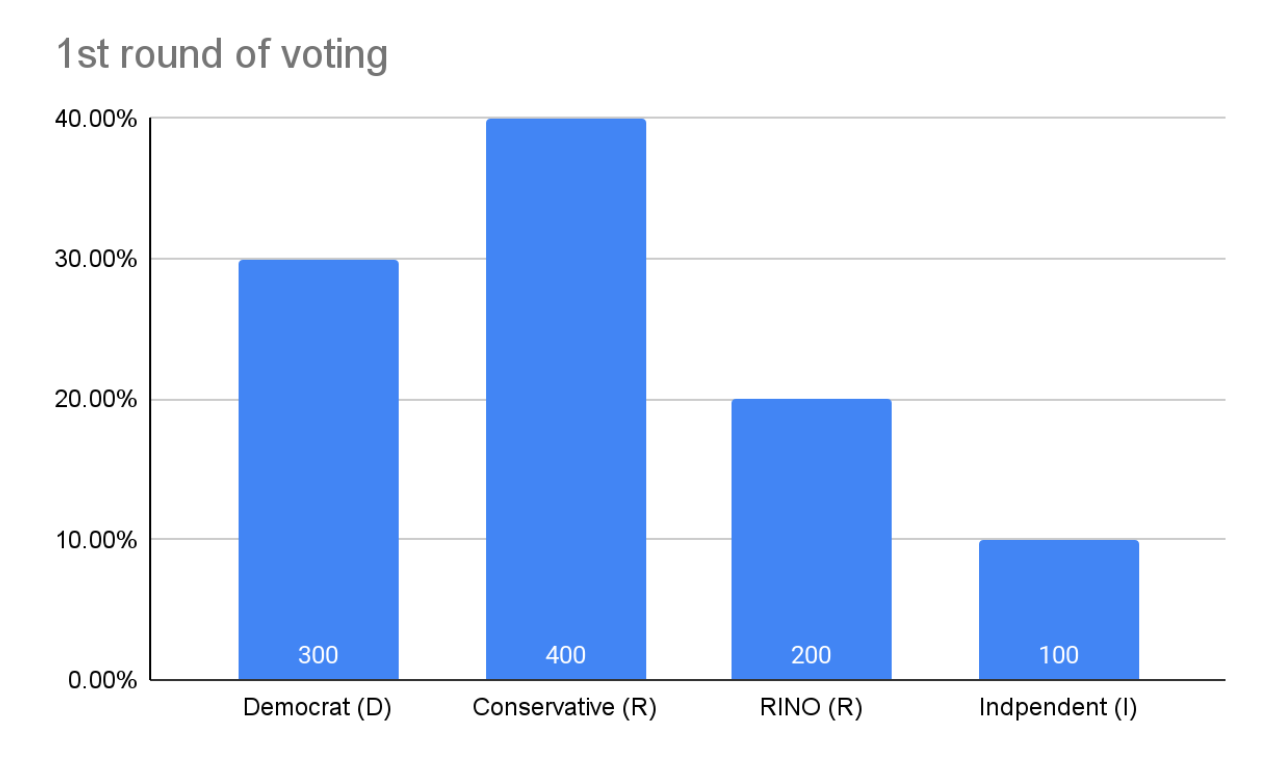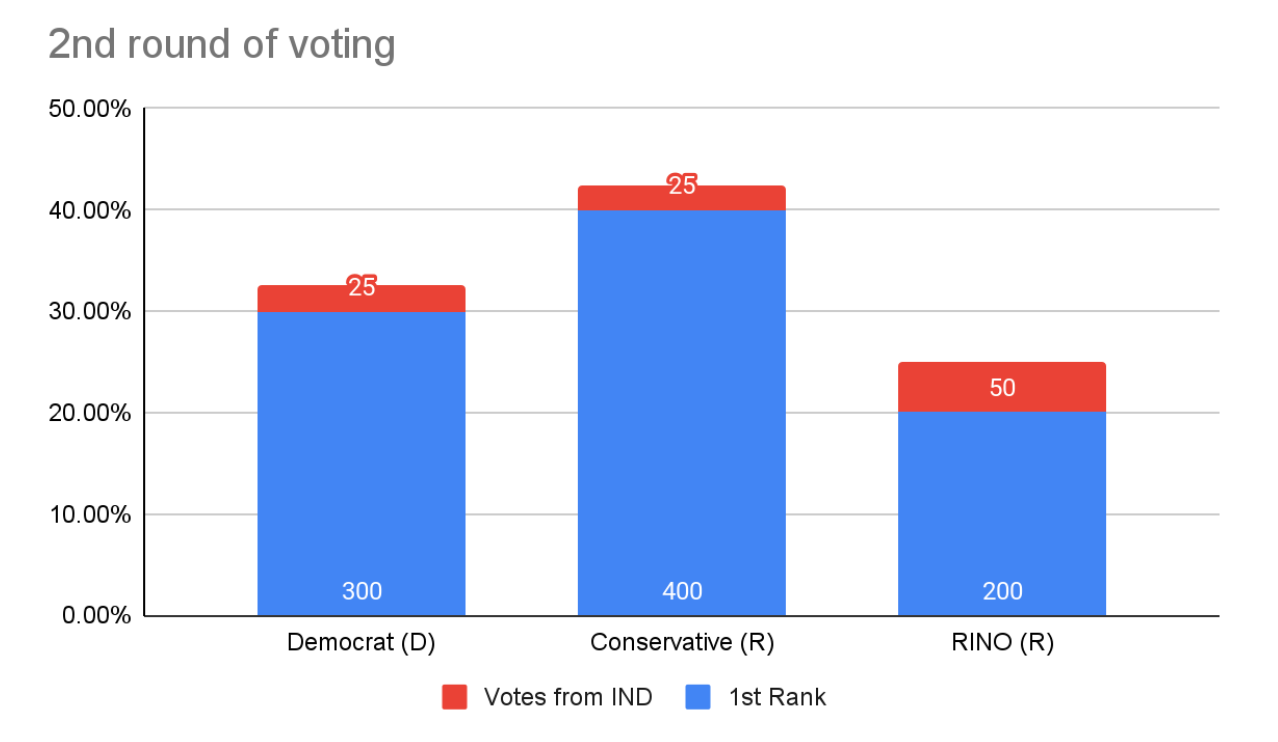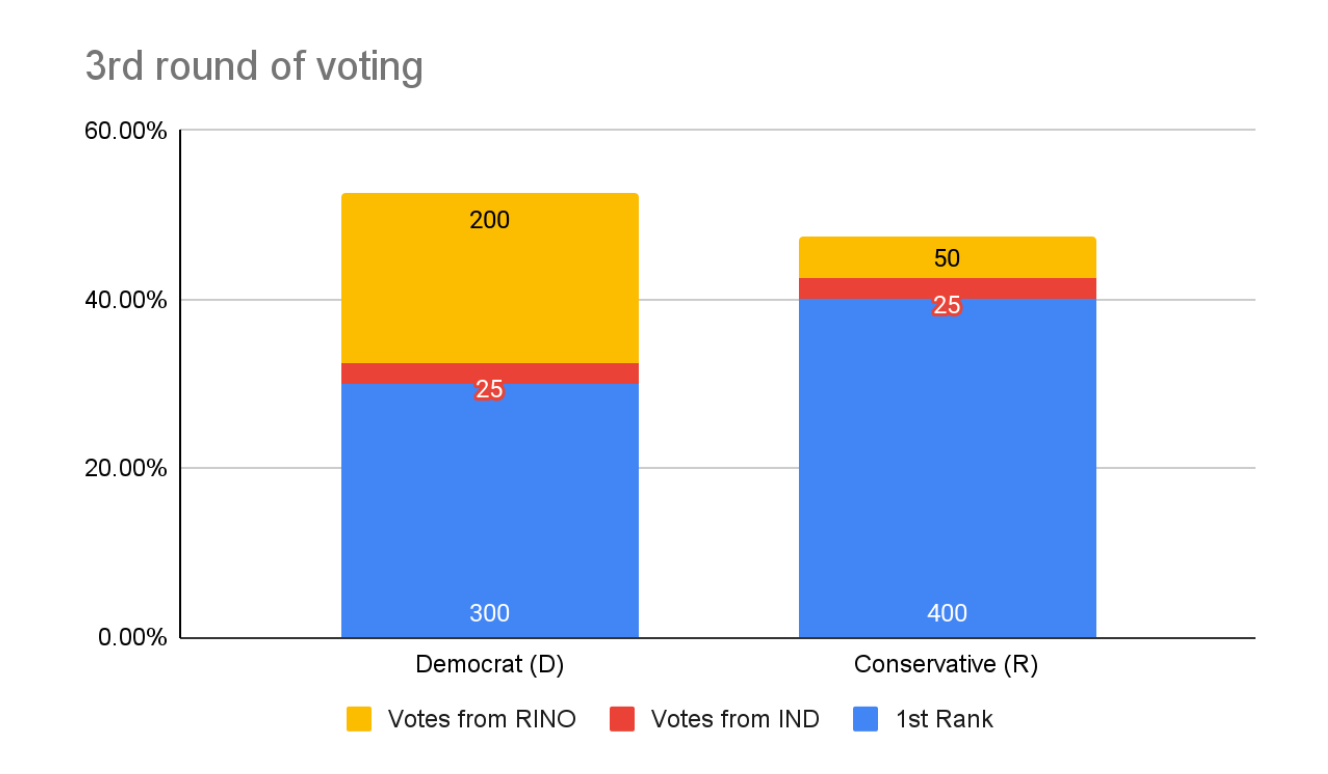What Exactly is Prop 1?

Proposition 1 is on the ballot in this upcoming election for Idaho, and many voters may be asking, “What exactly am I voting on?”
Prop 1 is confusing, misleading, and designed to disenfranchise Idaho voters as they elect their leaders. It’s primary mission is to remove the conventional norm of "One Person, One Vote” & “The candidate with the most votes wins;” but rather replace it with ranked-choice voting. I strongly recommend voting No on this proposed amendment
Ranked-choice voting is designed to marginalize & replace conservatives with more moderate or even liberal electors funded by millions of dollars from outside influences & special interest groups far removed from the local constituency.
Under this system, each voter would rank their top four candidates for a single office in order of preference. If you choose not to fill out all four candidates because it goes against your conscience, your vote could be exhausted from the final count. The process goes through multiple rounds of vote tabulation, with the votes from the losing candidates being recast to the voters' second, third, and fourth choices, until a candidate reaches over 50% of the total votes.
While this might sound like a more equitable approach, fair elections should not allow losing candidates re-enter the race for a second or third chance at victory. That's not fairness—it's double dipping and engineering the system to achieve a desired outcome.
In fair elections, candidates either appeal to enough voters to win the most popular votes, or they do not. It’s that simple. If someone believes Idaho is too far left or right, they’re free to join or create a party that aligns more with the center. If Idahoans truly wanted a more moderate candidate, that person would win a majority of votes during the primary and advance to the general election.
The truth is, most Idahoans don’t want a far-left candidate or a mediocre moderate who panders to both sides. They want a candidate with integrity who represents their core values and local constituency.
Prop 1 tricks voters into thinking they have more control & autonomy at the ballot box, only to end up swindled by cleverly creating a system that is designed to predetermine the outcome. The Democrats know Idaho is solid Republican so in order to change that, rank choice voting has to be implemented.
That is why rank choice voting is on the ballot this year in several Republican & swing states this election such as Idaho, Nevada, Oregon, & Colorado. Alaska is voting to repeal only after 2 years of using it in their last election and several states have taken legislative action to make it illegal in their respective States.
As we saw in Alaska in 2022, where Republicans have traditionally dominated in winning elections, ranked-choice voting prevented real conservatives from winning by splitting their votes and replacing them with Democrats. That’s why Democrats are pushing so hard for it here in Idaho—they can’t win a majority outright, so they’re trying to create a system that prevents conservatives from winning and deter future conservatives from ever running for office.
What is Prop 1?
Prop 1 seeks to change Idaho’s election laws in two key ways:
- It replaces party primaries with a blanket primary, advancing the top four candidates to the general election. Democrats are trying to sell this as an “open” primary, but that is misleading. It is a blanket primary which oftentimes is also known as a “jungle” primary.
- It replaces the principle of “One Person, One Vote” with ranked-choice voting in the general election.
Part 1: Party Primaries
Idaho’s current party primaries vet candidates before they reach the general ballot, either through open or closed primaries.
Let’s clarify the difference between these systems:
- Open primaries don’t require voters to be registered with a party to receive their party’s ballot. They can be unaffiliated or affiliated with a party and vote. The candidates listed on the ballot would be affiliated to their party’s ballot.
- Closed primaries require you to be registered with their party to vote in order to receive a ballot. If you are not registered with that party, you can still ask for & vote on that party’s ballot, but this will require you to register with that party.
- Closed primaries preserve a party’s freedom of association by better ensuring that only members of the party influence that party’s nominees.
- This helps prevent Democrats from crossing over party lines to vote in favor of a moderate or even liberal RINO (Republican in name only) in order to help advance them to the general election.To prevent this kind of manipulation, Idaho enacted closed primaries in 2011.
Blanket primaries, like what Prop 1 proposes, abolish party primaries altogether. It would require all candidates to be on the same ballot and allow candidates to be affiliated or unaffiliated with any party they choose which would make our election system less secure. This would allow candidates to list any party association, but without needing to be affiliated with that particular party. Under this blanket or also referred to “jungle” primary system, there would be no proper vetting process in place to ensure the integrity of that party’s nominees.
This means that Democrats in a solid “Red” State like Idaho, could heavily promote and vote for a liberal or RINO who puts a “R” next to their name. This clever strategy is done in order to siphon votes from the Republican voters in order to get the RINO to advance to the general election and split the vote with a real conservative Republican.
Prop 1 supporters claim that unaffiliated or more moderate voters in Idaho are shut out of participating in the primary election process. That is not true. In reality, under Idaho’s current primary system, unaffiliated voters can request and cast ballots in any party primary they choose.
If they want to vote for Republicans, they must register as a Republican, which they can do that same day. Each party gets to decide which candidates to list, and voters get to choose which ballot to use. This keeps the election fair and prevents manipulation from parties “crossing over” to manipulate the vote for each party’s nominees.
If unaffiliated voters want to elect a more moderate candidate, then there is nothing stopping them from creating a Moderate Party. They should rally support and organize a party that reflects their views.The best ideas win when people work to build a movement and are passionate about their cause. That is part of the democratic & grassroot process and people are free to associate with who they please.
The main reason we have party primaries is to ensure proper vetting of the candidates the party wishes to nominate based on the support from the local precincts, constituents, and platform of that party. This ensures voices are properly represented across the entire State and not just by party insiders, outside lobbyists & special interest groups that can heavily fund & influence the outcome of an election.
Without proper vetting, blanket primaries would allow candidates to deceive voters by pretending to be something they’re not. This type of system favors established interests and undermines what the majority of Idahoans truly stand for as a whole.
Imagine dozens of candidates on a ballot for just a single position—it becomes extremely confusing & difficult for voters to make informed choices not to mention the expense & long lines it would create at polling locations.
In Alaska’s 2022 blanket primary election, a Democrat with only 10% of the primary vote advanced to the general election and won through ranked-choice voting. How is that fair or democratic?
Part 2: Ranked-Choice Voting
The second part of Prop 1 introduces ranked-choice voting. After the blanket primary, the top four candidates advance to the general election. Instead of “one person, one vote,” voters rank four candidates in order of preference.
Imagine this scenario: The top four candidates are a Democrat, a RINO, a Conservative, and an Independent. Each voter ranks all four in order of preference. The candidate with the lowest number of votes is eliminated after each subsequent round. If a candidate is eliminated, their votes get redistributed based on their second, third, or fourth ranked choices. The process continues until a candidate gets over 50% of the total vote count which makes them the winner.
Here’s what that might look like if implemented in Idaho. To make it simple, we will use 1000 registered voters as an example.

1st round of voting:
- Democrat – 300
- RINO – 200
- Conservative – 400
Independent – 100 (these 100 votes would be redistributed based on what they ranked for 2nd, 3rd, & 4th)

2nd round of voting:
- Democrat – 325
RINO – 250 (these 250 votes would be redistributed based on what they ranked for 2nd, 3rd, & 4th)- Conservative – 425

3rd round of voting:
- Democrat – 525
- Conservative – 475
Totals after (3) rounds of voting:
- Democrat – 52.5%
- RINO – eliminated during 2nd round
- Conservative – 47.5%
- Independent – eliminated during 1st round
After three rounds, the Democrat, with only 30% of the initial vote, now has 52.5% and wins.
Ranked-choice voting allows those who've initially cast their ballot for a candidate who loses to "re-cast" their vote or “double-dip” back into the election pool to get the 2nd or 3rd most desirable outcome after their 1st preferred choice loses.
Prop 1 is a system that favors candidates who are not as popular to win, disenfranchising & demoralizing the majority of voters from wanting to participate. It has no place in a free & fair election. It shuffles votes from the losing candidate around after each subsequent round and is designed to disenfranchise you at the ballot box. It is synonymous to having your cake and eating it too, losing an election and then double dipping into the pool of ballots until you get the next favored result rather than letting Idahoans decide by majority in a single round.
Prop 1 will always favor those who stand to benefit from a system of more government, dependency, & establishment politicians who are funded by special interest groups & outside lobbyists. More government, regulation, and taxes without representation is not what the majority of Idahoans want and will hurt the middle class families and the conservative values that make this a great State to live.
When Republicans & Independents don’t vote, Democrats are elected along with the bad policies that come with it. Please get out and vote NO on Prop 1.

